人教版英语八年级上册 Unit1 Where did you go on vacation? Section A 课件(共26张PPT)
文档属性
| 名称 | 人教版英语八年级上册 Unit1 Where did you go on vacation? Section A 课件(共26张PPT) | 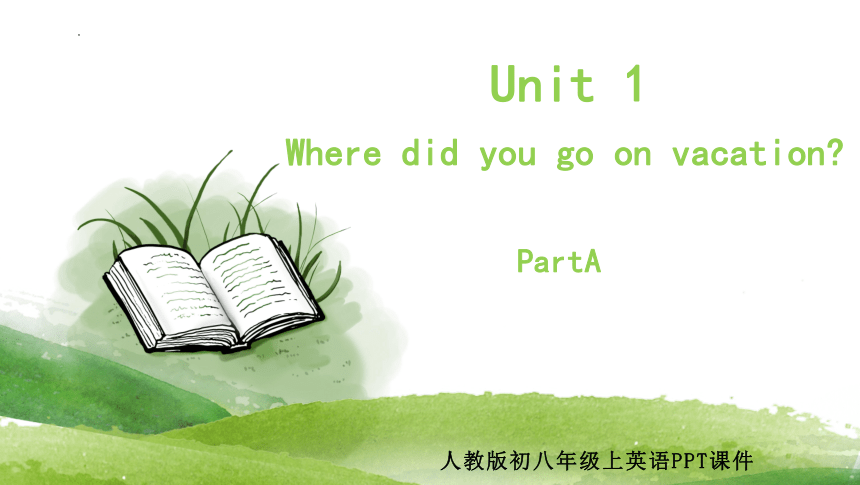 | |
| 格式 | zip | ||
| 文件大小 | 12.1MB | ||
| 资源类型 | 教案 | ||
| 版本资源 | 人教新目标(Go for it)版 | ||
| 科目 | 英语 | ||
| 更新时间 | 2022-07-21 14:08:45 | ||
图片预览




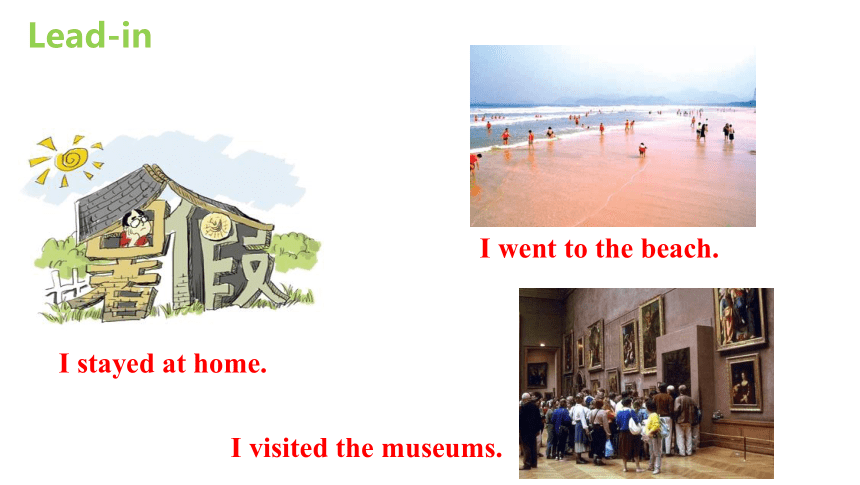

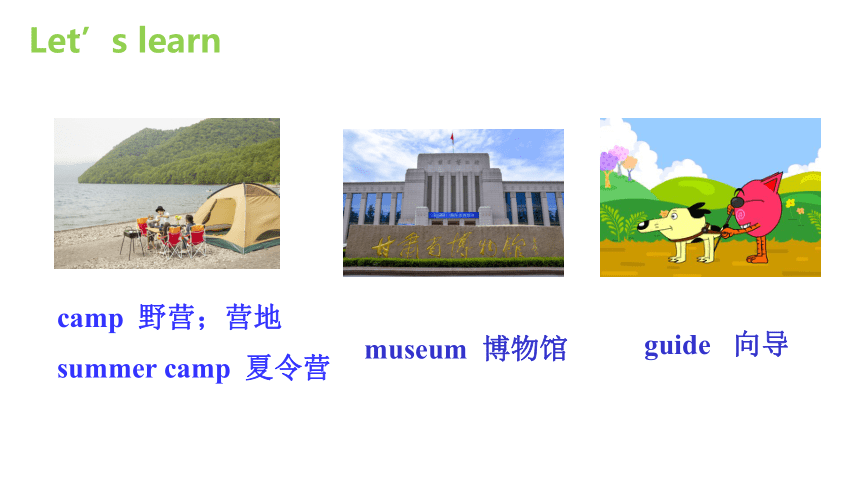
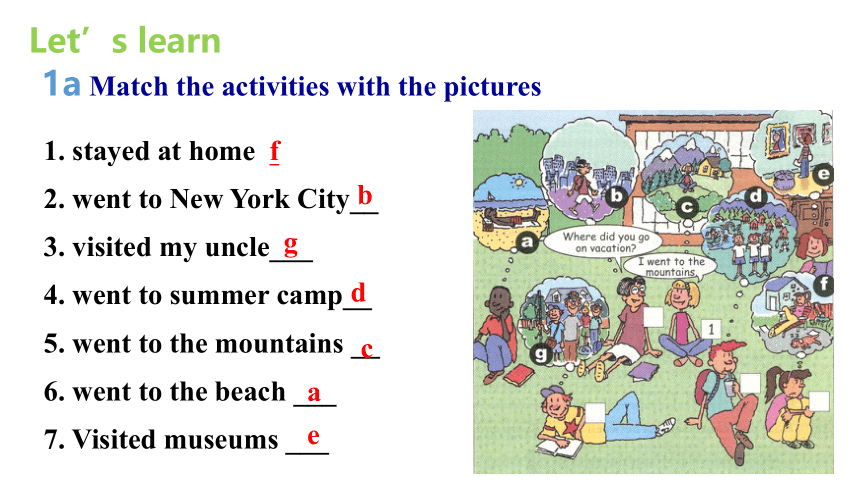
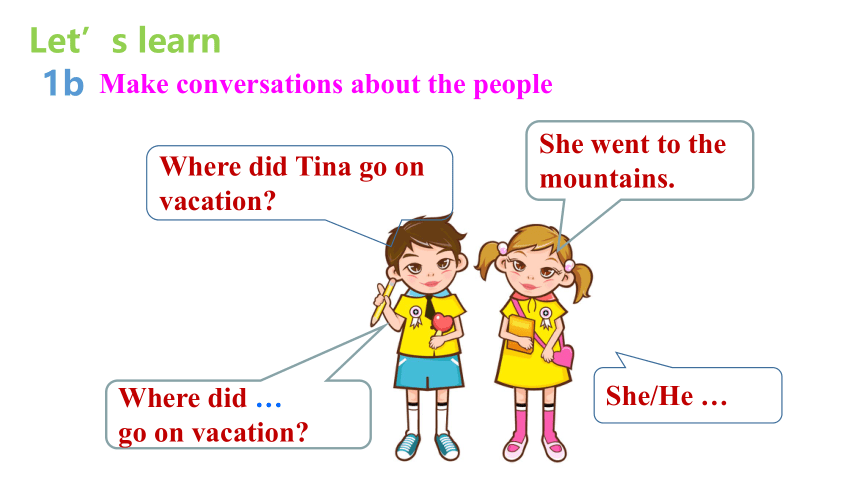
文档简介
(共26张PPT)
Where did you go on vacation
Unit 1
PartA
人教版初八年级上英语PPT课件
CONTENT
/ 目 录
01
教学导入
02
新课教学
03
教学互动
04
知识运用
01
教学导入
Lead-in
What did you do in your summer vacation
I went to Beijing for vacation.
I went to the mountains.
I went to summer camp.
Lead-in
I stayed at home.
I visited the museums.
I went to the beach.
02
新课授学
Let’s learn
camp 野营;营地
summer camp 夏令营
museum 博物馆
guide 向导
Let’s learn
stayed at home f
went to New York City__
visited my uncle___
went to summer camp__
5. went to the mountains __
6. went to the beach ___
7. Visited museums ___
Match the activities with the pictures
a
c
b
g
d
e
1a
Let’s learn
Make conversations about the people
She went to the mountains.
She/He …
Where did Tina go on vacation
Where did …
go on vacation
1b
Let’s learn
How was your vacation
Great!
Where did you go
I went to the mountains.
1c
Let’s learn
Grace: Where did you go on vacation
Julie: I went to Huangshan.
Grace: Oh, really Did you go with anyone
Julie: Yes, I went with my friends. We were very happy.
Grace
Julie
2a
Let’s learn
Rick: Hi, Helen. Long time no see.
Helen: Hi, Rick. Yes, I was on vacation last month.
Rick: Oh, did you go anywhere interesting
Helen: Yes, I went to Guizhou with my family.
Rick: Wow! Did you see Huangguoshu Waterfall
Helen: Yes, I did. It was wonderful! We took quite a few photos there. What about you Did you do anything special last month
Rick: Not really. I just stayed at home most
of the time to read and relax.
2b
Let’s learn
Read the conversation and match the people with the right place.
Helen
Rick
2c
Let’s learn
不定代词
不定代词:不指名代替任何特定名词或形容词的代词叫做不定代词。常见不定代词如下所示:
some 一些
somebody 某人
someone 某人
something 某事; 某物
nothing 无物
all 全体;全部
both 两个(都)
none 没人或物(指两个以上)
other(s) 另一个(些)
another 另外一个;又一个
much 很多
many 很多
Grammar
Focus
Let’s learn
anybody 任何人
anyone 任何人
anything 任何事物
no 无
nobody 无人
no one 无人
neither 没人或物 (指两个当中)
either 任何一个(指两个当中)
each 每个 every 每个
everybody 每人;大家;人人
everyone 每人
everything 每一件事物;一切
few 很少
a few 一些;几个
little 很少
a little 一些
one 一个(人或物)
Grammar
Focus
Let’s learn
一般过去时
构成
用法
动词的过去式
1. 表示过去某个时间发
生的动作或存在的状态。
2. 表示过去经常或
反复发生的动作。
(the day before) yesterday
last night / week
in 1990 / just now
On Sunday morning
two days ago
一般过去时
常用时间状语
Grammar
Focus
Let’s learn
动词过去式
的构成
规则动词
regular verbs
不规则动词
irregular verbs
Grammar
Focus
Let’s learn
1. 动词be的变化:
was
were
am
is
are
2. 助动词do的变化:
do→ did (在过去时里助动词do没有人称和数的变化)
如:Did you play soccer yesterday
Did he play soccer yesterday
Grammar
Focus
Let’s learn
规则动词过去式词尾-ed的读音
读音规则 读 音 例 词
在浊辅音和元音后面 /d/ moved /mu:vd/
在清辅音后面 /t/ passed /pa:st/
在浊辅音和元音后面 /id/ needed /’ni:did/
Grammar
Focus
Let’s learn
一般过去式的构成形式
肯定式 疑问式 否定式
I worked Did I work I did not work
He /she/it worked Did He /she/it work He /she/it did not work
We worked Did we work We did not work
You worked Did you work You did not work
they worked Did they work They did not work
Grammar
Focus
03
教学互动
Let’s play
Kevin, where did you go on vacation
I ...
Oh, really Did you go with anyone
Yes, I ...
Kevin, where did you go on vacation
Oh, really Did you go with anyone
Yes, I ...
4a
Let’s play
Julie, where did you go on vacation
I ...
Oh, really Did you go with anyone
Yes, I ...
4b
04
知识运用
Let’s do
用所给动词的适当形式填空。
We ______ (live) in Japan last year.
2. Jack________ (stop) the car last Sunday.
3. Tom _______ (clean) my room and ______(study)
for the Chinese test last weekend.
4.What ______ you ______(do) last night
5.On Sunday morning I _____ (play) tennis.
lived
stopped
cleaned
studied
did
do
played
4c
演讲完毕
感谢您的聆听
Where did you go on vacation
Unit 1
PartA
人教版初八年级上英语PPT课件
CONTENT
/ 目 录
01
教学导入
02
新课教学
03
教学互动
04
知识运用
01
教学导入
Lead-in
What did you do in your summer vacation
I went to Beijing for vacation.
I went to the mountains.
I went to summer camp.
Lead-in
I stayed at home.
I visited the museums.
I went to the beach.
02
新课授学
Let’s learn
camp 野营;营地
summer camp 夏令营
museum 博物馆
guide 向导
Let’s learn
stayed at home f
went to New York City__
visited my uncle___
went to summer camp__
5. went to the mountains __
6. went to the beach ___
7. Visited museums ___
Match the activities with the pictures
a
c
b
g
d
e
1a
Let’s learn
Make conversations about the people
She went to the mountains.
She/He …
Where did Tina go on vacation
Where did …
go on vacation
1b
Let’s learn
How was your vacation
Great!
Where did you go
I went to the mountains.
1c
Let’s learn
Grace: Where did you go on vacation
Julie: I went to Huangshan.
Grace: Oh, really Did you go with anyone
Julie: Yes, I went with my friends. We were very happy.
Grace
Julie
2a
Let’s learn
Rick: Hi, Helen. Long time no see.
Helen: Hi, Rick. Yes, I was on vacation last month.
Rick: Oh, did you go anywhere interesting
Helen: Yes, I went to Guizhou with my family.
Rick: Wow! Did you see Huangguoshu Waterfall
Helen: Yes, I did. It was wonderful! We took quite a few photos there. What about you Did you do anything special last month
Rick: Not really. I just stayed at home most
of the time to read and relax.
2b
Let’s learn
Read the conversation and match the people with the right place.
Helen
Rick
2c
Let’s learn
不定代词
不定代词:不指名代替任何特定名词或形容词的代词叫做不定代词。常见不定代词如下所示:
some 一些
somebody 某人
someone 某人
something 某事; 某物
nothing 无物
all 全体;全部
both 两个(都)
none 没人或物(指两个以上)
other(s) 另一个(些)
another 另外一个;又一个
much 很多
many 很多
Grammar
Focus
Let’s learn
anybody 任何人
anyone 任何人
anything 任何事物
no 无
nobody 无人
no one 无人
neither 没人或物 (指两个当中)
either 任何一个(指两个当中)
each 每个 every 每个
everybody 每人;大家;人人
everyone 每人
everything 每一件事物;一切
few 很少
a few 一些;几个
little 很少
a little 一些
one 一个(人或物)
Grammar
Focus
Let’s learn
一般过去时
构成
用法
动词的过去式
1. 表示过去某个时间发
生的动作或存在的状态。
2. 表示过去经常或
反复发生的动作。
(the day before) yesterday
last night / week
in 1990 / just now
On Sunday morning
two days ago
一般过去时
常用时间状语
Grammar
Focus
Let’s learn
动词过去式
的构成
规则动词
regular verbs
不规则动词
irregular verbs
Grammar
Focus
Let’s learn
1. 动词be的变化:
was
were
am
is
are
2. 助动词do的变化:
do→ did (在过去时里助动词do没有人称和数的变化)
如:Did you play soccer yesterday
Did he play soccer yesterday
Grammar
Focus
Let’s learn
规则动词过去式词尾-ed的读音
读音规则 读 音 例 词
在浊辅音和元音后面 /d/ moved /mu:vd/
在清辅音后面 /t/ passed /pa:st/
在浊辅音和元音后面 /id/ needed /’ni:did/
Grammar
Focus
Let’s learn
一般过去式的构成形式
肯定式 疑问式 否定式
I worked Did I work I did not work
He /she/it worked Did He /she/it work He /she/it did not work
We worked Did we work We did not work
You worked Did you work You did not work
they worked Did they work They did not work
Grammar
Focus
03
教学互动
Let’s play
Kevin, where did you go on vacation
I ...
Oh, really Did you go with anyone
Yes, I ...
Kevin, where did you go on vacation
Oh, really Did you go with anyone
Yes, I ...
4a
Let’s play
Julie, where did you go on vacation
I ...
Oh, really Did you go with anyone
Yes, I ...
4b
04
知识运用
Let’s do
用所给动词的适当形式填空。
We ______ (live) in Japan last year.
2. Jack________ (stop) the car last Sunday.
3. Tom _______ (clean) my room and ______(study)
for the Chinese test last weekend.
4.What ______ you ______(do) last night
5.On Sunday morning I _____ (play) tennis.
lived
stopped
cleaned
studied
did
do
played
4c
演讲完毕
感谢您的聆听
同课章节目录
- Unit 1 Where did you go on vacation?
- Section A
- Section B
- Unit 2 How often do you exercise?
- Section A
- Section B
- Unit 3 I'm more outgoing than my sister.
- Section A
- Section B
- Unit 4 What's the best movie theater?
- Section A
- Section B
- Unit 5 Do you want to watch a game show?
- Section A
- Section B
- Unit 6 I'm going to study computer science.
- Section A
- Section B
- Unit 7 Will people have robots?
- Section A
- Section B
- Unit 8 How do you make a banana milk shake?
- Section A
- Section B
- Unit 9 Can you come to my party?
- Section A
- Section B
- Unit 10 If you go to the party, you'll have a grea
- Section A
- Section B
